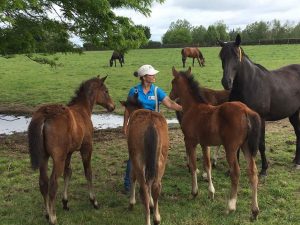“Ten Tips When Working With Your Foal”

“Ten Tips When Working With Your Foal”
About Sally
– Foal NZ founders Leigh Wills and Sally King have presented at public demonstrations, conferences and thoroughbred studs globally. Since 2000 the pair has completed over 18,000 foal training sessions without injury. Foal NZ graduates have become million-dollar yearlings in the sales ring and multiple winners of Group One races.
Sally trained and worked for many years as an equine behavioural specialist in England and California. Her most treasured time was the years she spent at Flag Is Up Farms with Pat and Monty Roberts; teaching, managing Monty’s public appearances and assisting Monty to write and edit his books.
Sally returned to NZ in 2006 to help develop and deliver the Foal NZ education process. She provides much of the structure, and her planning and development skills complete the team of Foal NZ.
About This Episode
“Ten Tips When Working With Your Foal”
To Listen to Sally King on YouTube – Click Here
To Listen to Sally King on iTunes – Click Here
Or Listen below
“Ten Tips When Working With Your Foal”
1) Begin your handling when your foal is between 3-8 weeks of age.
2) Set up a safe environment before handling – a small yard with safe high fencing and good footing
3) Ensure your mare is familiar with the yard and relaxed. If possible, make sure she is paddocked as close to the yard as you can, and/or bring her paddock companions with her and keep them within sight
4) Use protective pads against one corner of your yard (this can be as simple as sacks stuffed with straw)
5) Your mare’s perception of the training session will dictate how the foal perceives the session. If she is anxious (link to how to read emotions), then her foal will mirror that. So, your first priority is to ensure she feels comfortable and then that she can find some benefit during her time with you. It may be that she likes being scratched, licking salt, or is content to stand quietly; whatever she would like is what you give her. If she doesn’t feel safe with you, then the foals’ learning will be affected
6) Position your mare backed into a corner of the yard, with her rump touching the fence. Allow your foal to move into a position where he is beside her near side shoulder and facing the same way as her. This is the position you will handle your foal in
7) When you are initially touching and handling your foal, movements needs to be minimised. As soon as you place a hand on your foal, move your body alongside their shoulder so they are sandwiched between you and the mare. Keep your body close at all times, and your movements ‘in oil’. If your foal becomes stressed and tries to leave, contain him with your arms around his chest and rump
8) You have perhaps 10-15 minutes in which to train your foal before she becomes overwhelmed and needs to drink and rest
9) If your foal seems anxious, contain him closer to the mare and slow down the work you are doing (haltering, picking up feet). It is important, however, to continue working to avoid creating anticipation
10) Use your mare to make the lessons easy for your foal. When you want your foal to lead, ask your mare handler to step the mare forward, and allow your foal to follow his mare while you move alongside his shoulder. The mare stopping movement will help him stop etc
Time Stamps
01:30 – Background
05:05 – 1) Begin your handling when your foal is between 3-8 weeks of age.
06:24 – 2) Set up a safe environment before handling – a small yard with safe high fencing and good footing
07:06 – 3) Ensure your mare is familiar with the yard and relaxed.
09:35 – 4) Use protective pads against one corner of your yard (this can be as simple as sacks stuffed with straw)
10:37 – 5) Your mare’s perception of the training session will dictate how the foal perceives the session.
13:04 – 6) Position your mare backed into a corner of the yard, with her rump touching the fence.
15:30 – 7) When you are initially touching and handling your foal, movements needs to be minimised.
17:18 – 8) You have perhaps 10-15 minutes in which to train your foal before she becomes overwhelmed and needs to drink and rest
18:35 – 9) If your foal seems anxious, contain him closer to the mare and slow down the work you are doing.
20:38 – 10) Use your mare to make the lessons easy for your foal.
23:30 – Contact: see details below
Sally’s Contact Details
Phone: +64 27437 8870 (Auckland New Zealand)
Email:
Website: www.foalnz.com or Equus Education
Facebook: Equus Education
Also Listen to
Music
BenSound.com
When Sally is a return guest on Horse Chats, what question would you like to ask her?
(Please leave comment below)